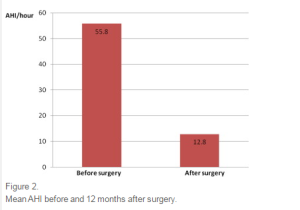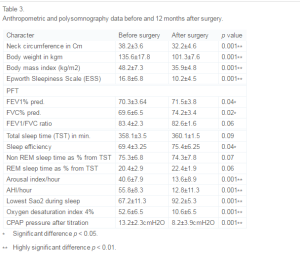
05 Dec Assessment of the effect of bariatric surgery on severe obstructive sleep apnea patients not tolerating CPAP therapy
Obstructive sleep apnoea (OSA) is more and more prevalent worldwide accompanying with high rates in morbidity and mortality. One of the principal treatments is CPAP but for some patients it brings several problems related to compliance and adherence to the equipment. On the other hand, obesity is highly linked to OSA and researchers have investigated that weight loss can help in treatment. For that reason a group of investigators of the Zagazig and Alex Universities in Egypt have assessed the effect of bariatric surgery on severe obstructive sleep apnoea patients not tolerating the CPAP therapy.
The study is a prospective single center observational study; it was done in the pulmonary rehabilitation center in association with the surgical department in Al-Amiri hospital, Ministry of Health, State of Kuwait in the period between June 2013 and July 2015. They included 22 patients documented to have morbid obesity (BMI > 40) and severe OSA with Apnoea Hypopnea Index (AHI) >30/h and not tolerating CPAP therapy, these patients were offered sleeve gastrectomy then were followed up for 12 months before another polysomnography was done to assess the presence of OSA and need for CPAP.
Results: The mean age of the patients was 37.2 ± 17.3 years, 13 males and 9 females. After sleeve gastrectomy and follow up for 12 months the body weight decreased from 135.6 ± 17.8 to 101.3 ± 7.6 kg m (p = 0.001), BMI dropped from 48.2 ± 7.3 to 35.9 ± 4.8 kg m/m2 (p = 0.001), mean AHI decreased from 55.8 ± 8.3 to 12.8 ± 11.3 attacks/hour of sleep (p = 0.001) and CPAP pressure needed to control OSA was decreased from 13.2 ± 2.3 to 8.2 ± 3.9 cm H2O (p = 0.001).
It is important to say that the value of SPO2 had an important improvement as well as the index of arousals which may prevent comorbidities related with these two aspects.
The conclusion the researchers came to was that for patients with a high BMI and AHI, sleeve gastrectomy could reduce the severity of OSA or the level of CPAP required for effective therapy, they also concluded that it could even be an alternative treatment option for patients in this cohort whom are not compliant to CPAP.
[1] H. Shaarawya, , Abdelrahman Sarhanb, A. EL Hawaryc. Assessment of the effect of bariatric surgery on severe obstructive sleep apnea patients not tolerating CPAP therapy. Egyptian Journal of Chest Diseases and Tuberculosis. Volume 65, Issue 3, July 2016, Pages 661–666

